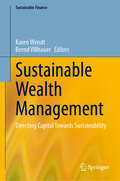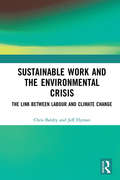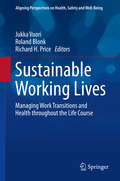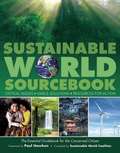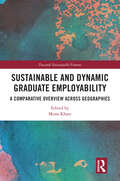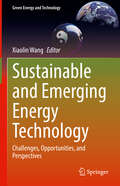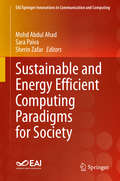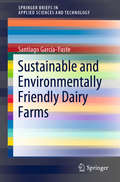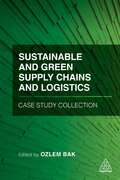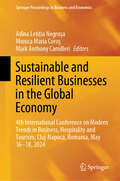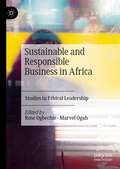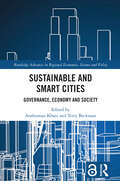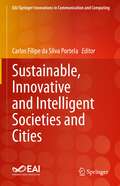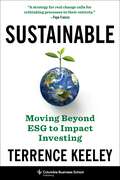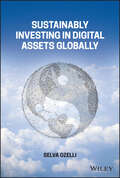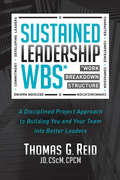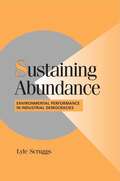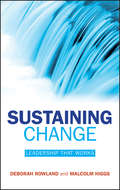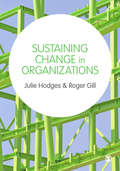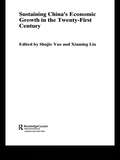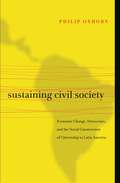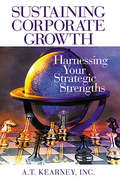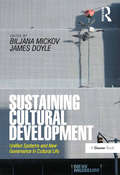- Table View
- List View
Sustainable Wealth Management: Directing Capital Towards Sustainability (Sustainable Finance)
by Karen Wendt Bernd VillhauerThis book explores sustainable wealth management and the challenges that arise for asset managers in times of ecological crises and climate change. It deals with portfolio engineering, combining risk and impact, transitioning from environmental, social, and governance (ESG) concepts to Sustainable Development Goals (SDG) concepts and the different role of the intermediaries and players in the financial markets. It provides researchers, scholars, academics and policy makers an interdisciplinary approach to redirecting capital towards sustainability.
Sustainable Work and the Environmental Crisis: The Link between Labour and Climate Change
by Jeff Hyman Chris BaldryCompared to 20 years ago, the jobs many people do today are increasingly characterised by low pay and insecurity, while countless others cope with workplace stress and ill-health. At the same time the consequences of our current model of economic activity are creating dangerous and critical changes in the planet’s climate. Until recently debates around these two issues have had little contact with each other. This book demonstrates that there are definite and complex connections between degraded jobs and a degraded environment, that neither the dominant economic model nor the rate at which we exploit the planet’s resources are sustainable and that the limits for both may be reached sooner rather than later. By bringing together insights from critical thinkers in a range of disciplines, the book discusses the requirements and characteristics for work to be at the same time economically, socially and environmentally sustainable and examines the potential for alternative routes to sustainable work in policies and actions that support both the natural environment and worker well-being. The book will be of interest to researchers, academics and students in the fields of HRM, labour studies, employment relations, sociology, environmental studies and sustainability. It is particularly relevant for those focusing on the link between labour and climate change. It is also highly relevant to policymakers, trade unions and NGOs looking at decent work and sustainability.
Sustainable Working Lives
by Jukka Vuori Roland Blonk Richard H. PriceThe purpose of this volume is to describe the impact of the increased demand for flexibility on employees and its impact on their individual work life trajectories and health. The volume offers concrete examples of interventions aimed to find innovative ways of sustainable work careers for today's workers. We focus on the school to work transition, job insecurity, job loss and re-employment and retirement. The interventions described offer strategies for implementing support in employment contracts, increasing preparedness of individual employees with public education programs or developing work arrangements and support systems in work organizations.
Sustainable World SourceBook
by Sustainable World CoalitionThe Sustainable World SourceBook is designed to support readers in finding pathways for effective individual and group action. It cuts through the glut of information, providing a clear, concise overview of the most important issues and aspects of sustainability that everyone needs to know.
Sustainable and Dynamic Graduate Employability: A Comparative Overview across Geographies (Towards Sustainable Futures)
by Mona KhareThis volume presents a theoretical and strategic discussion on the linkages between sustainable graduate employability and economic growth. With case studies from India, South Africa, Taiwan, UK, Germany, USA, UAE, Australia, and France, it looks at the skills training and education landscape around the world, examines the state of employment, and offers case-specific recommendations. The book analyzes the role of higher education and vocational education policies and strategies in integrating skill training in education in order to achieve quality education and sustainable employment for all. An important critique of skills training, education policy and planning, the volume will be an essential read for scholars and researchers of sustainable development, development studies, public policy, political economy, labour studies, and education. It will also be useful for policymakers.
Sustainable and Emerging Energy Technology: Challenges, Opportunities, and Perspectives (Green Energy and Technology)
by Xiaolin WangSustainable and Emerging Energy Technology: Challenges, Opportunities, and Perspectives presents advanced technologies and research results in theoretical, experimental, and practical sustainable and emerging energy engineering. Contributions cover theoretical analyses and case studies to explore new concepts, technological advancements, and practical applications to help engineers and researchers better understand the relevant concepts and solutions necessary to achieve global Sustainable Development Goals. The book brings together the latest developments in the emerging areas of renewable systems and technologies, green energy buildings, intelligent power systems, microgrids, energy storage, and security. Coverage includes: Renewable energy systems and applications; Power generation and efficiency; Power transmission, distribution, and control; Power grids and microgrids; Energy storage and conversion; Energy efficiency in conventional and renewable energy systems; Energy systems for buildings; Integration of renewable energy sources in buildings; Greening urbanization and urban settlements. This book is a valuable resource offering practical approaches to help engineers and researchers in sustaina
Sustainable and Energy Efficient Computing Paradigms for Society (EAI/Springer Innovations in Communication and Computing)
by Sara Paiva Mohd Abdul Ahad Sherin ZafarThis book provides insights into recent trends and innovation of technologies aiming to provide sustainable and energy efficient computing. The authors discuss approaches to provide solutions to real life societal issues and problems using sustainable and energy efficient computing approaches. The book gathers research and state of the art reviews on solutions for societal benefits by using sustainable approaches of computing. The book also intends to provide use-cases for certain real life societal problems. The book can be used by researchers of similar areas, technologists, environmentalists, educationists, research scholars and UG/PG Students as well.
Sustainable and Environmentally Friendly Dairy Farms (SpringerBriefs in Applied Sciences and Technology)
by Santiago García-YusteSustainable and Environmentally Friendly Dairy Farms presents an innovative environmental proposal. While chiefly focusing on dairy farms, the environmental solution it describes is applicable to the entire livestock sector. The book is divided into five chapters, the first of which addresses the carbon footprint of dairy farms. Chapter two provides an overview of the animal production system, focusing on the physiology of the ruminant stomach and the greenhouse gases emitted by dairy cows. In turn, the third chapter covers dairy farm systems, explaining both intensive and extensive husbandry systems. The book’s final two chapters present the-state-of-art in CO2 capture, and describe a new and innovative CO2-RFP strategy. Given its scope, the book will be of interest to chemists, biologists, biotechnologists, and researchers active in agriculture and food-related areas, as well as those working in the food and dairy industry.
Sustainable and Green Supply Chains and Logistics Case Study Collection
by Dr Ozlem BakSustainability is an increasingly urgent and important factor in logistics and supply chain management, impacting the whole supply chain lifecycle from product design and development, to supplier management, packaging, transportation, warehousing and distribution.The third volume of the Supply Chain Case Study Collection, the Sustainable and Green Supply Chains and Logistics Case Study Collection contains real-life scenarios from leading companies who are pursuing a sustainability agenda. Cases cover sustainability and 'green' practices in a range of different industries, from food through to manufacturing and construction, and in a variety of organization sizes. They are written by leading international academics and feature cutting-edge research from countries including India, Vietnam, Brazil, China and the UK. By exploring examples of waste reduction, supplier management, the circular economy and cross-industry collaboration, the Case Study Collection focuses on how organizations are currently trying to meet sustainability goals and achieve success in greening supply chains.
Sustainable and Resilient Businesses in the Global Economy: 4th International Conference on Modern Trends in Business, Hospitality and Tourism, Cluj-Napoca, Romania, May 16–18, 2024 (Springer Proceedings in Business and Economics)
by Mark Anthony Camilleri Adina Letiția Negrușa Monica Maria CoroşThis book explores the latest trends, challenges, and opportunities shaping the business, hospitality, and tourism sectors, with a special focus on Eastern Europe. It presents a collection of thought-provoking papers from the 2024 Modern Trends in Business, Hospitality, and Tourism International Conference, held in Cluj-Napoca, Romania. Key topics include the evolution of global capital markets and investment strategies in the post-COVID-19 era, innovative and sustainable business models, alternative financing solutions for SMEs, corporate governance reforms, and the future of human capital leadership. Each chapter offers fresh perspectives on building resilient businesses in an increasingly interconnected global economy. Ideal for academics, researchers, industry experts, and practitioners, this book provides valuable insights and practical solutions for fostering sustainable growth and resilience in today’s dynamic business environment.
Sustainable and Responsible Business in Africa: Studies in Ethical Leadership
by Marvel Ogah Rose OgbechieThis book provides a transnational African perspective on business management concerns and business ethics by examining the concepts of responsible business practices and sustainability across sub-Saharan Africa. Covering topics ranging from ethical advertisement to responsible pricing to waste management for sustainable business, it highlights the importance of consciously and deliberately inculcating responsible practices in the creation and operation of business activities within a corporate context to achieve sustainability in African markets. The book employs a case-by-case method for treating issues in responsible business practice and sustainability, with contributions illustrating responsible and irresponsible business practices across various areas of business management. Relevant to the UN Sustainable Development Goals, it will be of great importance to academics and students of responsible business, sustainability, business ethics and African business more broadly. It will also be a helpful guide for professionals and business owners to understand some salient issues in navigating sustainable business practices in Africa.
Sustainable and Smart Cities: Governance, Economy and Society (Routledge Advances in Regional Economics, Science and Policy)
by Anshuman Khare Terry BeckmanThis book provides a comprehensive overview of the challenges modern cities face in the context of climate change and urban development. By integrating varied viewpoints, it delves into the concept of sustainable and smart cities and sheds light on the opportunities for innovative and effective solutions, underscoring the interconnected nature of urban challenges and the necessity of a holistic approach.Contributors present diverse perspectives and methodologies, including empirical studies, modelling, simulation, policy analysis, and case studies, to offer insights into innovative and effective solutions for urban sustainability challenges. Chapters are grouped according to themes of governance and management, economy, society, and technology. Topics covered include smart city governance models, the enabling role of managers in sustainability efforts, resilient infrastructure, homelessness, and smart technology implementations. The book also identifies research gaps and areas of uncertainty, which may guide future research.With contributions from researchers across Asia, Europe, and North America, this book is a valuable resource for researchers in the areas of sustainable development, urban sustainability, and resilience research. It will also interest policymakers, practitioners, and stakeholders working towards addressing climate change in urban areas.An electronic version of this book is freely available, thanks to the support of libraries working with Knowledge Unlatched (KU). KU is a collaborative initiative designed to make high quality books Open Access for the public good. The Open Access ISBN for this book is 9781003518419. More information about the initiative and links to the Open Access version can be found at www.knowledgeunlatched.org.
Sustainable by Design: Explorations in Theory and Practice
by Stuart WalkerTo advance the subject of design one has to engage in the activity of designing. Sustainable by Design offers a compelling and innovative, design-centred approach that explores both the meaning and practice of sustainable design. Walker explores the design process in the context of sustainability, and challenges conventional ways of defining, designing and producing functional objects. He discusses the personal design process, tacit knowledge, ephemeral design, experimental design, and the relationship between intellectual design criteria, physical expression and aesthetic experience. This book will introduce vital concepts to students and will inspire designers by providing a well-articulated basis for understanding the complexity and potential of sustainable design, and extolling the contribution of design to the creation of a more meaningful material culture.
Sustainable, Innovative and Intelligent Societies and Cities (EAI/Springer Innovations in Communication and Computing)
by Carlos Filipe da Silva PortelaThis book combines two main topics applied to cities and societies: innovation and sustainability. The book begins by showing a brief overview of the book's main topics; then, the book addresses four main areas which allow our communities to be more attractive, engaging and fun; analytical, descriptive and predictive; healthy, secure and sustainable; and innovative, connected and monitored. This book represents a union of inputs from researchers and practitioners where each chapter has distinct, valuable and practical contributions that turn it unique. The content ranges from theoretical, like studies or analyses to practical, like industrial solutions or engaging systems. Both branches focus on turning our society more attractive, intelligent, inclusive, sustainable, and ready for the future.
Sustainable: Moving Beyond ESG to Impact Investing
by Terrence KeeleyShould business and finance play larger roles in resolving the great social and environmental challenges of our time? Proponents of environmental, social, and governance (ESG) investing say yes. They argue that ESG financial strategies can help reverse runaway carbon emissions and fix income and gender inequalities, among other ills. ESG-integrated investments already encompass more than $120 trillion in financial assets. Are they working as promised? If not, how can they be improved?In Sustainable, a finance-industry veteran offers an insider’s look at the promises, prospects, and perils of ESG investing. Terrence Keeley argues that many ESG advocates have been overly optimistic about what it can accomplish. Divestment threats are ineffective tools for altering corporate behavior, and verifiably “good” companies do not systematically generate great returns. Most importantly, business and finance cannot cure social ills on their own: regulators, public policies, civil society, and individuals must all play specific, complementary roles to shape the future we want. Keeley provides comprehensive solutions that would promote more inclusive, sustainable growth. In particular, he recommends reallocating capital from some indexed products toward an emerging class of strategies with more verifiable social and environmental benefits. Keeley identifies dozens of alternative “impact investing” strategies that could generate true double bottom lines. He also highlights promising civic organizations with proven methodologies for achieving widely shared benefits at scale.Proposing practical, actionable, and in many cases profitable solutions to social and environmental problems, Sustainable offers an incisive vision of the roles business and finance can and should play in building a flourishing society.
Sustainably Investing in Digital Assets Globally
by Selva OzelliDiscover how to dip your toe into the cryptocurrency investing pool without getting burned In Sustainably Investing in Digital Assets Globally, international finance and fintech expert Selva Ozelli delivers an eye-opening and insightful discussion of cryptocurrency investment, as well as the risks and opportunities that await those who deal in this promising new technology. In the book, the author explores how cryptocurrencies have been used by illicit operators throughout the US and the world and how legitimate investors have sought to limit their exposure to illegal activity. Readers will also find comprehensive treatments of US-based and global cryptocurrency regulations, as well as: Advice for investors concerned about the environmental sustainability of blockchain technology but who still wish to invest in cryptocurrencies Information about a variety of countries and governments who have explored and implemented various cryptocurrency initiatives inside their own borders Discussions surrounding the drive by many central banks to introduce a digital currency, in addition to the surging popularity of non-fungible tokens A can&’t-miss handbook for the crypto-curious investor, Sustainably Investing in Digital Assets Globally deserves a place in the bookshelves of anyone with an interest in international finance, fintech, technology, or cryptocurrency.
Sustained Leadership WBS: A Disciplined Project Approach to Building You and Your Team into Better Leaders
by Thomas G. ReidThe Sustained Leader WBS provides a comprehensive tool for assessing and improving leadership potential. A Work Breakdown Structure decomposes every part of the work to be done in a project. Through extensive research and surveys the author has identified 229 WBS elements that apply to building yourself into a sustained leader. Each element provides a self-assessment, additional resources, and a place to record personal goals and due dates giving each reader a personal program plan to build themselves into a better leader.
Sustaining Abundance: Environmental Performance in Industrial Democracies (Cambridge Studies in Comparative Politics)
by Lyle ScruggsThe ultimate goal of environmental policy is reducing pollution. Attention to environmental problems in the social sciences has brought some bold generalizations about causes of good results, but almost no systematic cross-national studies that flesh out major theoretical arguments and test those claims with data. This study makes a seminal contribution to that effort in two ways. First, by taking environmental outcomes over the last thirty years as the central dependent variable, it provides a basis for evaluating national performance in reducing environmental problems. Second, by developing a data set including performance in a number of countries and elaborating on major explanations of environmental performance found in the literature, this study provides the most rigorous available analysis of the determinants of environmental performance. In so doing, it challenges what is probably the conventional wisdom in the social sciences.
Sustaining Change
by Rowland Deborah Higgs MalcolmThis is a book destined for leaders who wish to implement change more intelligently and effortlessly. Drawing on a combination of rigorous research and extensive organizational experience, the authors present a framework for leading change, ?Changing Leadership?, that describes the specific leader practices they have found make the biggest difference between success and failure in implementing high magnitude change. In doing all of this, the leader works to make change happen in the day to day activity and conversations of the organization.
Sustaining Change in Organizations
by Roger Gill Julie HodgesIndispensable to understanding change, this unique text provides a comprehensive examination of how change can be sustained within organizations today. Featuring critical insights into theoretical concepts and current international examples, the book provides an accessible way for students to enhance their understanding and develop the crucial skills need to be successful when managing and leading change in organisations. Key Features: Synthesizes what is known about change in organizations and then provides practical ways of sustaining it Contains an international range of case studies and interviews which link theory to practice throughout Explores key contemporary topics such as power, politics, ethics and sustainability for an enhanced understanding of current debates and issues Activities, discussion questions and further reading in each chapter test your understanding of the key concepts and reinforce your learning End of book Glossary defines key terms, for those new to studying change. Comes with access to additional resources for students and lecturers including relevant SAGE journal articles to encourage wider reading
Sustaining China's Economic Growth in the Twenty-first Century (Routledge Studies on the Chinese Economy)
by Shujie Yao Xiaming LiuEconomic growth in China has been exceptionally strong in recent decades, but the country still faces enormous economic problems, including huge poverty, uneven regional development, the problems associated with strengthening capital formation, modernising and making more productive the very large former state sector. This book presents the work of
Sustaining Civil Society: Economic Change, Democracy, and the Social Construction of Citizenship in Latin America
by Philip Oxhorn“South America is not the poorest continent in the world, but it may very well be the most unjust.” This statement by Ricardo Lagos, then president of Chile, at the Summit of the Americas in January 2004 captures nicely the dilemma that faces Latin American countries in the wake of the transition to democracy that swept across the continent in the last two decades of the twentieth century. While political rights are now available to citizens at unprecedented levels, social and economic rights lag far behind, and the fledgling democracies struggle with long legacies of poverty, inequality, and corruption. Key to understanding what is happening in Latin America today is the relationship between the state and civil society. In this ambitious book, Philip Oxhorn sets forth a theory of civil society adequate for explaining current developments in a way that such controversial neoconservative theories as Francis Fukuyama’s liberal triumphalism or Samuel Huntington’s “clash of civilizations” cannot. Inspired by the rich political sociology of an earlier era and the classic work of T. H. Marshall on citizenship, Oxhorn studies the process by which social groups are incorporated, or not, into national socioeconomic and political development through an approach that focuses on the “social construction of citizenship.”
Sustaining Civil Society: Economic Change, Democracy, and the Social Construction of Citizenship in Latin America
by Philip Oxhorn“South America is not the poorest continent in the world, but it may very well be the most unjust.” This statement by Ricardo Lagos, then president of Chile, at the Summit of the Americas in January 2004 captures nicely the dilemma that faces Latin American countries in the wake of the transition to democracy that swept across the continent in the last two decades of the twentieth century. While political rights are now available to citizens at unprecedented levels, social and economic rights lag far behind, and the fledgling democracies struggle with long legacies of poverty, inequality, and corruption. Key to understanding what is happening in Latin America today is the relationship between the state and civil society. In this ambitious book, Philip Oxhorn sets forth a theory of civil society adequate for explaining current developments in a way that such controversial neoconservative theories as Francis Fukuyama’s liberal triumphalism or Samuel Huntington’s “clash of civilizations” cannot. Inspired by the rich political sociology of an earlier era and the classic work of T. H. Marshall on citizenship, Oxhorn studies the process by which social groups are incorporated, or not, into national socioeconomic and political development through an approach that focuses on the “social construction of citizenship.”
Sustaining Corporate Growth: Harnessing Your Strategic Strengths
by A.T. Kearney, Inc.The classic nursery story of "Jack and the Beanstalk" reads like a business dream come true: risky deal promises great returns, is scorned by skeptics, and ultimately results in phenomenal growth and profits. In the business world, Jack's fairy-tale experience is mirrored in the experiences of a select group of companies. The common thread: larger-
Sustaining Cultural Development: Unified Systems and New Governance in Cultural Life
by James Doyle Biljana MickovIn Sustaining Cultural Development, Biljana Mickov and James Doyle argue that effective programmes to promote greater participation in cultural life require substantial investment in research and strategic planning. Using studies from contributors throughout Europe, they look at ways to promote cultural life as the centre of the broader sustainable development of society. These studies illustrate how combining cultural identity, cultural diversity and creativity with increased participation of citizens in cultural life improves harmonized cultural development and promotes democracy. They indicate a shift from traditional governance of the cultural sector to a new, more horizontal, approach that links cultural workers at different levels in different sectors and different locations. This book will stimulate debate amongst cultural leaders, city managers and other policy makers, as well as serving as a resource for researchers and those teaching and learning on a range of post-graduate courses and programmes.
